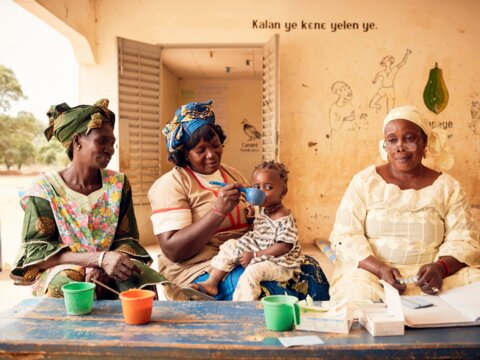OPT-SMC: Mali project
Evaluating three approaches to improve coverage and adherence of SMC in Dioila, Mali

Mali was one of the first countries to implement a pilot SMC programme in 2012. Stratification in Mali in 2020 showed that SMC should be implemented in 53 Health Districts with 3 and 5 cycles reflecting the duration of the malaria season. Since then, several delivery strategies have been used to deliver SMC: door-to-door, fixed, and mobile.
This OPT-SMC project compared classic SMC delivery (drug distributor visits on the first day and leaves the medicines with the caregivers) versus Directly Observed Therapy for three days by the drug distributor and SMC-plus (drug distributor visits on the first day, then a community helper visits on 2nd and 3rd days). The study took place in the Dioila Health District, Koulikoro region, which is located in the centre of Mali. Six health areas were randomly selected, and each of the three strategies were implemented in two of the selected areas. Focus group discussions and in-depth interviews were conducted with caregivers and community representatives to explore the barriers and facilitators of the three delivery approaches. A coverage survey was carried out by our supporting partner, PMI, to measure SMC coverage and adherence over the 3 days per SMC cycle.
Qualitative findings from caregivers and drug distributors highlighted poor adherence and the need to strategies to improve this. Results from the study indicated that a 3-day directly observed therapy for SMC is becoming more widely used due to concerns about adherence, despite it being costly. However, strategies that were simpler than a 3-day DOTs, such as SMC-plus may be just as effective in terms of coverage and adherence, with the benefit of being cheaper for more long-term use.
The study was presented at the EDCTP 3 Forum in Paris, November 2023. The country team attended the writing workshop in Senegal to finalise their paper "Evaluation of SMC using three approaches: DOT3, community SMC and the Standard SMC to improve coverage and adherence to SMC in Mali."